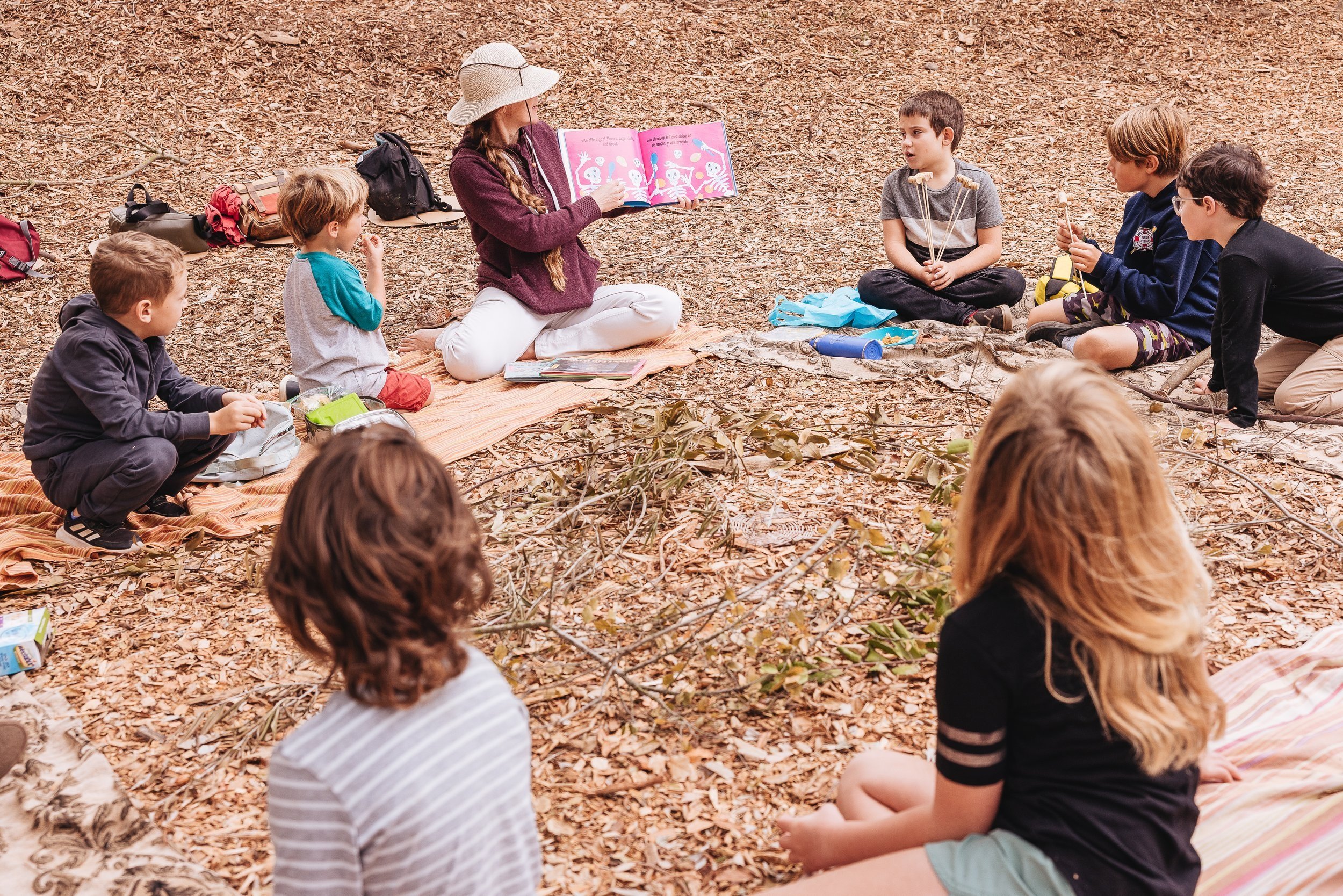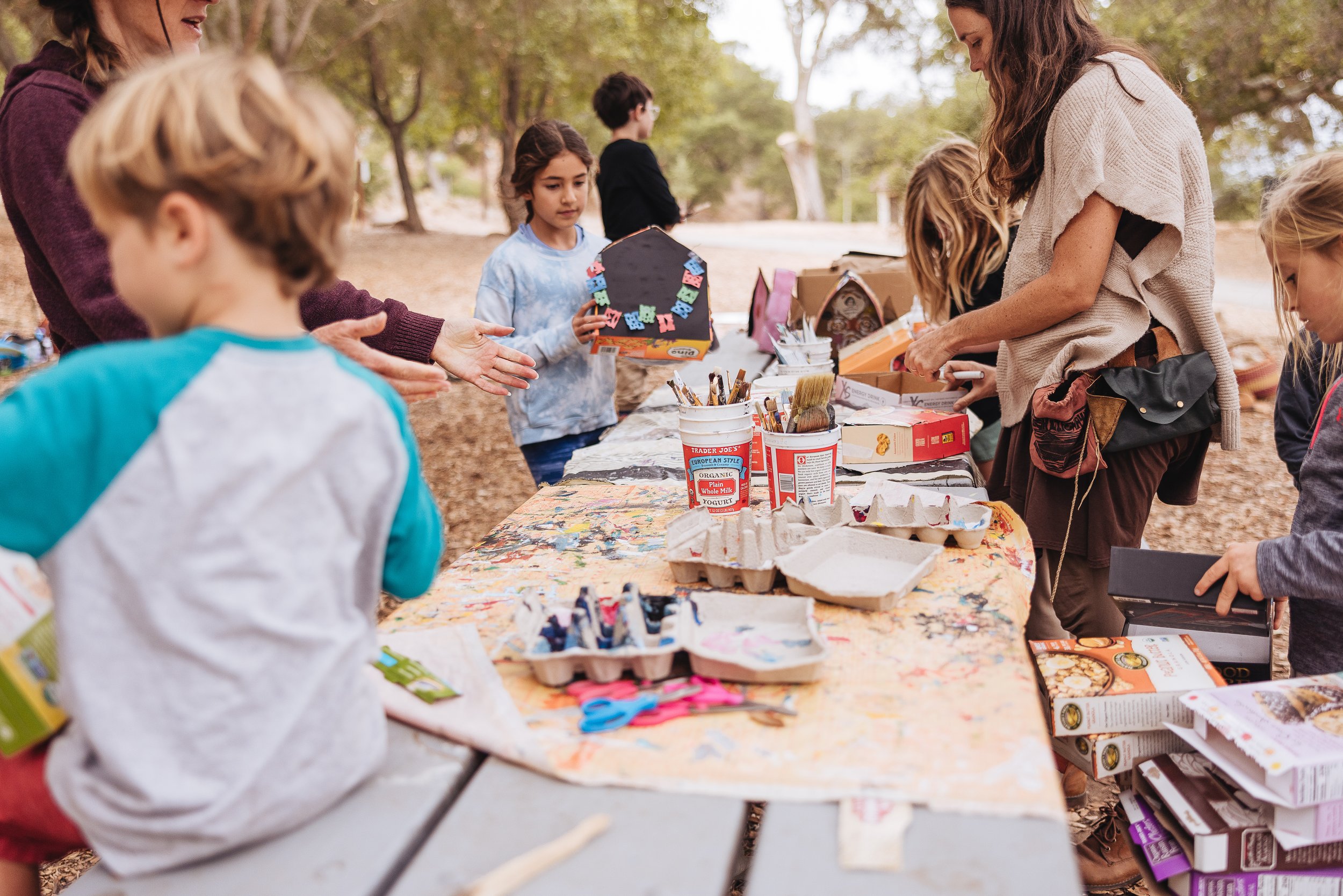
Self-directed learning includes the whole family.
Community Wisdom Circles
Our Community Wisdom Circles are an integral part of our community at True North as the children we nurture are primarily in relationship with you, their parents.
This weekly gathering for the adults in our community is our chance to be together, hold intentional space to connect and reflect on self-directed learning principles and practices that support whole families.
As we listen and witness, share stories and wisdom, we build community together, deepen our connections and offer each other support for the parenting journey.
Extended family members, such as grandparents, are welcome to join.
Come as you are and bring your whole self and a willingness to explore and learn with your body, mind, and heart.

"Children don't come to us as individuals, but rather as members of families.”
-- Tom Hobson
Play is Essential
We believe wholeheartedly in the wholesome and age-old proven effectiveness of play-based learning; what we call ‘plearning’.
During plearning times, activities include - nature play, rock hopping, reading, lizard hunting, mud pie making, tree climbing, studying field guides, crafting, storytelling, acting out plays, music, ninja practice, discovery walks, plant identification, singing, sewing, spinning yarn, painting, weaving, bird watching, cloud gazing, running, dancing, swinging in a hammock, cooking projects, slackline, games......and more! The mixed aged children learn so much from each other and the facilitators share their many skills and passions with the children as well.
FAQs
-
We seek to serve the whole family through our family memberships which include access to two community days per week, a weekly adult Community Wisdom Circle, as well as seasonal events and campouts.
Our drop-off programming currently serves learners ages 4.5 - 12 years of age. We have consciously chosen to structure the program with adult facilitators, young adult assistant facilitators, and junior mentors.
We encourage mixed age learning for our participants through daily, active social engagement where older children can teach, healthily challenge, and model for younger children; and younger children can learn and also teach the older participants about being patient, slowing down, and listening.
-
Brenda Soutar says, "…We enroll the family, not the child, and that child comes with their ancestors surrounding them." She speaks of school, not as an institution, but as a family, and she tells us that the smallest Māori family unit is 70-80 individuals, and that includes ancestors both past, present, and future. The goal, she says, is not independence, but rather to foster interdependence.
In a village setting children would learn how to relate to the world (and each other) and what tools were necessary for survival by watching older peers and adults. Children would practice, copy, and explore what they saw on their own. Older children and adults were there to offer guidance, ensure safety, and assist with the development of new skills and learnings.
At True North, we know we can not fully recreate the village. But, we can borrow what was useful, skillful, and vital about village living. Intergenerational support, modeling, guidance, skill-building, and communication skills are directly transferable to our modern reality.
True North prioritizes personal agency, relationship-building, communication skills, and a sense of place and belonging. We feel that if a child or youth feels healthy in these ways, that they can learn anything they want to.
True North welcomes the participation of parents and family members. We believe in the benefits of a multi-generational community. Parents and grandparents, aunties and uncles, siblings and family friends — all are welcome to participate as community members.
Ongoing volunteers and facilitators must be fingerprinted and background checked.
As True North members, families commit to the values and principles of self-directed education (SDE), and commit to attending at least one of our weekly Community Wisdom Circles (CWCs) per month, and commit to our compassionate communication approach to conflict resolution.
Families pay a sliding scale membership fee of $50-$250 per month based on income. Our sliding scale is sustainable by families paying what they are able.
Families wanting to access the drop-off programming must become members of the community and will pay a monthly materials and location rental fee of $25 per child in lieu of the monthly membership dues.
-
True North is a learning community. We do not operate legally as a school as that would inhibit the freedom of our learning community. TN offers a supportive community for families who wish to be outside the box of conventional schooling so they may enjoy the freedom to determine the nature of their child's education and maintain sovereignty over their family's lifestyle and schedule.
Below is a list comparing a few basic aspects of conventional school and the TN learning community:
Conventional school
-children are separated by age
-grades are administered as a way of evaluating and comparing children's performance
-attendance and obedience is compulsory
-learning is extrinsically motivated
-teaching is oriented to testing
-children must ask permission to fulfill basic bodily needs such as going to the bathroom, eating or freely moving their body and usually may only do these things within certain pre-determined timeframes during the day
-children are taught what the state has mandated
-children are indoors most of the school day
-teacher oriented and hierarchically structured
-children are not allowed to socialize during class
-play is seen as an "extra" that is to be fit in only after the important work of learning is done
-compliance and good grades are what defines success
TN learning community
-mixed-ages
-no grades are given, we do not believe in comparing children's varying strengths
-consent-based
-learning is intrinsically motivated
-no tests, learning is determined by the individual's interests
-children are in charge of their own body and may eat, rest, move or go to the bathroom whenever they need to
-children learn what they are interested in while being immersed in a rich and exciting community environment
-children spend their days immersed in nature and the world outside of the four walls of a conventional classroom
-learner oriented and community structured
-children determine for themselves when they want to be socially engaged or when they need time to themself. Through a well-tended social-emotional container, children are supported in healthy social engagement play is seen as central to a child's learning and well-being
-success is determined by the well-being of the whole child
-
Children are born with the natural learning drives of curiosity, playfulness, sociability, and the desire to be in charge of their life and learning. When those drives are supported rather than interfered with (through coercive educational approaches) authentic learning will flourish. Children forced to learn will often do only enough to satisfy the authority figure. Whatever they learn is easily forgotten. But those who learn out of their own choice and interest will retain that knowledge for a lifetime. Self-directed learning fosters a child’s internal motivation, which is a much more powerful driver to learning than external coercion.
-
True North practices three main principles: take care of yourself, take care of each other and take care of our environment. Additionally we have developed, with the children's input, community agreements; behavioral boundaries and consequences to keep the community safe. These boundaries are ever being assessed and discussed amongst the staff and children. When issues arise, facilitators model compassionate communication, engaging in fact finding, stating observations, feelings, needs, and requests. We also use the end of the day CARE meetings to address issues that need to be further processed by the whole group.
If a child is feeling dysregulated to the extent that they are hurting themselves or others, a facilitator will call the parent to request that the child be taken home to rest and recover. This is not intended as a punishment but rather as a safety measure to provide care for both the child whose behavior is dysregulated as well as the other members of the community.
In SDE and respectful parenting (which go hand-in-hand) the approach to hurtful behavior is to try and understand the source of the dysregulation and offer support. When children are having a difficult time regulating their behavior, often they need time at home to rest, connect and process so that they can return to the group feeling refreshed.
If dysregulated behavior persists over time, a discussion of the child's needs will be had between TN and the family to determine if TN is able to continue to meet the child's needs at this time or if the child would have their needs better met elsewhere.
-
Step 1
Fill out inquiry form and schedule an informal chat with one of our families or facilitators.
Step 2
Come visit us on one of our Community Days (Fridays).
Step 3
Fill out an application form.
After our Admin Circle reviews your application, we will make a determination about membership. If your application is accepted, you will be sent a Community Agreement to sign.
You will also be sent an Enrollment Agreement if your child(ren) will be attending any of our drop-off days (Mondays, Wednesdays or Thursdays).
Next Steps
Once you’ve signed, we will send you the following:
-an emergency form to fill out for the drop-off program;
-a link to pay your membership dues and/or tuition.
You’ll then receive access to our Parent Portal and your family and/or child(ren) can begin attendance on their agreed-upon start date.
Parent Resources
-
How Children Learn By John Holt
Free to Learn By Peter O. Gray
Hold On to Your Kids By Gabor Mate and Gordon Neufeld
Deschooling Society By Ivan Illich
Non-Violent Communication By Marshall B. Rosenberg
Decolonizing Non-Violent Communication by meenadchi
Raising Free People by Akilah Richards
Why Are You Still Sending Your Kids To School? by Blake Boles
-
-
-
-
-



